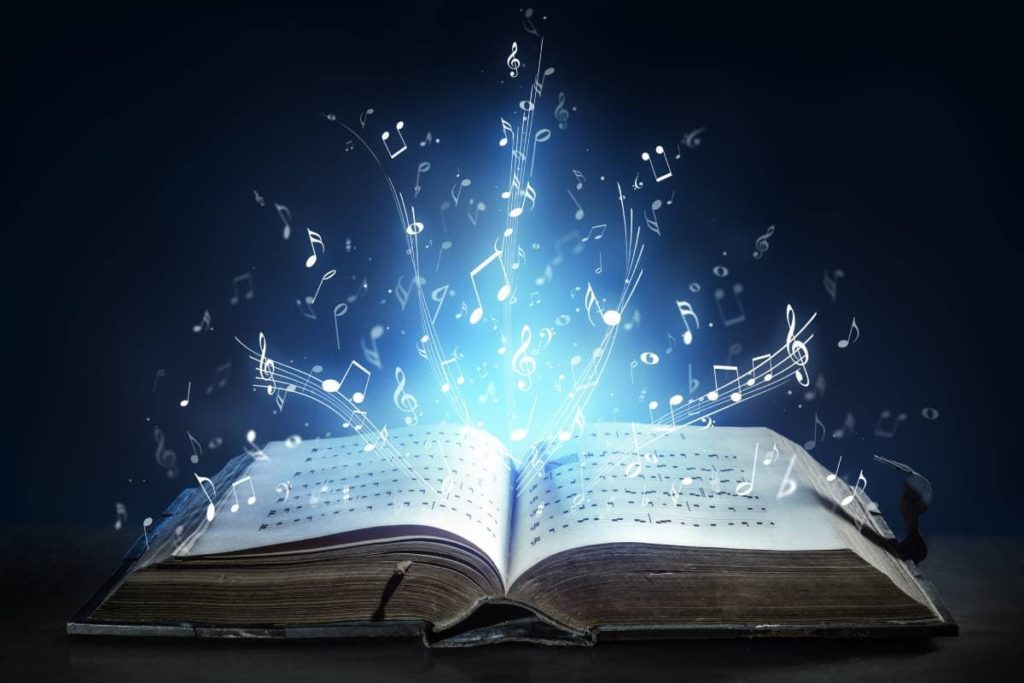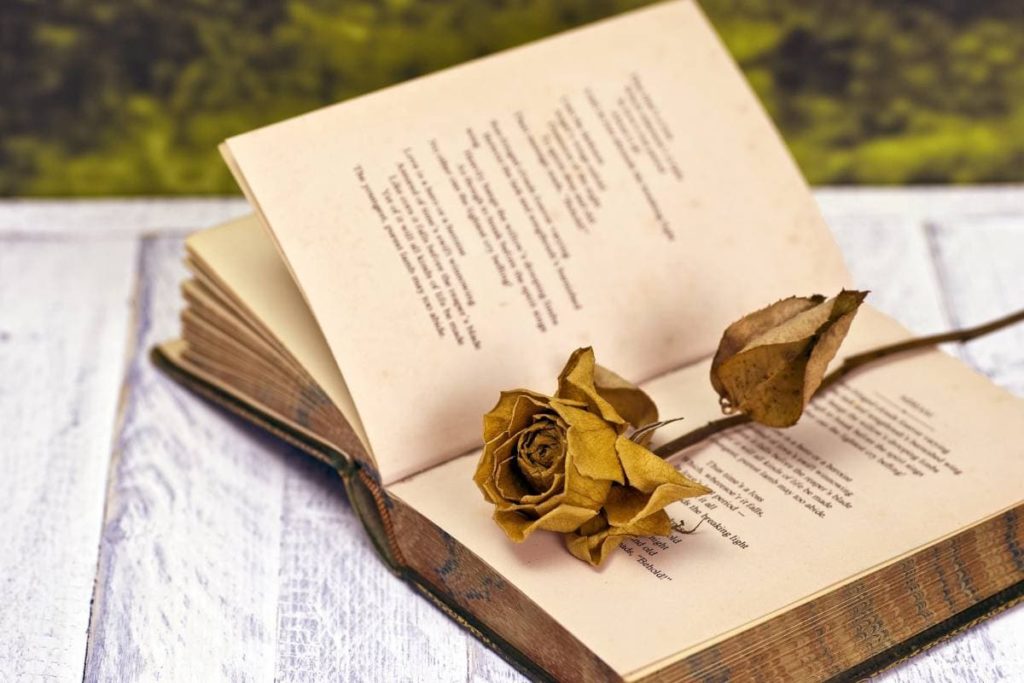Ezra Pound, the famed American poet, once expressed, “Music begins to atrophy when it departs too far from the dance…poetry begins to atrophy when it gets too far from music.” Based on Pound’s quote, it’s evident that music and poetry share many similarities. However, the two remain distinctive forms of creative expression.
Here are 4 differences between music and poetry:
- Poetry doesn’t require a tune.
- Music and poetry have different forms and structures.
- Interpretations of music and poetry are different.
- Poetry and music are appreciated differently.
Thanks to their likeness, people have made connections between music and poetry for millennia. While the similarities are certainly noteworthy, the differences allow art lovers to truly appreciate the importance of both art forms. Read on to learn more about the differences between poetry and music.

1. Poetry Doesn’t Require a Tune
Despite poetry’s long history as a form of music, both art forms remain their own forms of creative expression. The primary difference between the two is that poetry doesn’t require singing vocals or instrumentation.
Poets do not design their work around a melodic backdrop.
Meter, pattern, and the implementation of emotion are commonplace in poetry, music, and song lyrics. Poetry and song lyrics also both utilize rhyming words and phrases, verses, and literary devices to create rhythm.
Unlike song lyrics, however, poetry takes place against a wall of silence, whereas artists write lyrics within the context of a specific melody.
Songs Are Not Always Poetry
Music, according to Merriam-Webster, is defined as, “vocal, instrumental, or mechanical sounds having rhythm, melody, or harmony.”
Melody, rhythm, instruments, and vocal ability each play a role in producing song lyrics. The result is typically a well-structured work of art that evokes an emotion or tells a story, usually both.
That sounds exactly the same as poetry, right? Well, not exactly.
You can listen to and read poetry, and you can listen to music, but you can’t read a song, because, without auditory elements, a song is not a song. In a sense, it becomes a poem.
The two aren’t written to be interchangeable. With that said, song lyrics can function as poetry and vice versa. However, lyrics do not usually function as well as standalone writings, and poetry, explicitly written to be spoken or read aloud against a backdrop of silence, may not fare well when set to music.
In fact, composing music around the words of poetry often results in dramatic failures. However, the right talent sometimes results in beautiful works of art.

2. Music and Poetry Have Different Forms and Structures
Most modern-day songs utilize the verse, chorus, and bridge format. The following “ABABCB” structure is the most common, especially among top hits:
- Verse
- Chorus
- Verse
- Chorus
- Bridge
- Chorus
- Outro
That’s not to say that musicians can’t deviate from this structure. They can, but this is only one example of a musical form, and it’s quite common.
Poems, too, utilize structure through rhyming lines and meter. Rhythm is maintained using an emphasis on specific syllables. However, patterns, meter, and rhyme are all intentionally removed in free-verse poetry.
With meter and rhyme eliminated, the factors that closely link music and poetry are no longer there.
3. Interpretations of Music and Poetry Are Different
Poems tend to be more ambiguous than song lyrics, whereas song lyrics often clearly elucidate their meaning. In fact, many poets deliberately write poetry without a definitive meaning to further engage the audience and encourage intellectual discussion.
For this reason, it’s a common theme for poets to include multiple hidden meanings in their poetic works, leaving them open to several different interpretations. Music, even when utilizing wordplay, often stays pretty direct.
Although this isn’t always the case, it’s more common in music versus poetry.
Judging Music vs. Poetry
Because poems are words organized in a rhythmic pattern designed to be recited aloud, they’re often judged based on:
- Meaning
- Cadence
- Emphasis
- Emotion
- Syllabic beats
Music, on the other hand, is usually judged based on how well each of the following elements blends together to create a work of art:
- Melody
- Beat
- Vocals
- Instrumentation
- Lyrics
4. Poetry and Music Are Appreciated Differently
Poetry and music both involve rhythm, flow, expression, feelings, and deeper meaning. As discussed throughout this article, the primary difference is the absence of words, in some musical compositions, and the absence of music in poetry.
Although these two art forms are similar and of equal importance and value, appreciation of poetry and music differ widely.
Poetry and Music in School
In educational settings, poetry is considered to be of more literary significance than songs due to the use of different literary devices and poetry’s ambiguity.
Poems are often read and analyzed in the classroom, whereas songs, particularly modern ones, aren’t taught throughout many K-12 curriculums. If a song is introduced or studied in school, it’s usually because it’s of cultural or historical significance relating to a specific course, not for the interpretation of its meaning.
In addition, poetry, because it’s most often written and recited by the writer, usually features a higher level of internal reflection and personal experience. Through this, the audience forms empathy for the artist, which can result in a higher appreciation for their work.
Of course, music also regularly achieves empathic appreciation, especially if the listener relates to the story or the meaning behind it. However, people seem more connected with the song itself versus the singer.
Contrarily, in poetry, people often feel a connection to the poet.
Assumptions Regarding Music and Poetry
It’s wrong to assume that song lyrics and musical compositions have less educational and emotional value than poetry. The biases perpetuated by these opinions cause problems for poets, lyricists, and songwriters.
For example, because poems find their way into literary studies, people assume they’re serious and more sophisticated than song lyrics. Music may be seen as inferior or lighter in nature, but neither assumption has any basis in fact.
Song lyrics, too, can showcase excellent literary skill and technique, while poetry can be fun, upbeat, and lighthearted. Neither affects the overall value of the creative work.
Despite this, the fact remains that people place more emphasis on poetry than song lyrics in school settings. While this is an unfortunate truth, people can still learn to appreciate both art forms equally.
| Poetry vs. Music | |
| Poetry | Music |
| Written or spoken words are arranged rhythmically using meter. However, free-form poetry eliminates the use of meter, patterns, and rhyme. | Written or sung words are arranged in the context of a specific melody. |
| Structure often utilizes stanza, meter, and rhyming scheme. Although that’s not the case in free-verse poetry. | Structure depends upon the music. Therefore, consideration is given to tune, instruments, vocal ability, rhythm, and other factors. |
| Most poems have a specific structure but do not have particular expectations of length. | While there’s no standard limit on songs, the length of most modern hits is around 3 minutes and 30 seconds. Of course, songs by Queen go a lot longer. |
| Poems use imagery, rhythm, and sound, through syllabic beats, cadence, and other factors, to express a theme but do not require instrumentation or melody. | Songs express themes through lyrics and melody. The melody often helps convey the message. |

